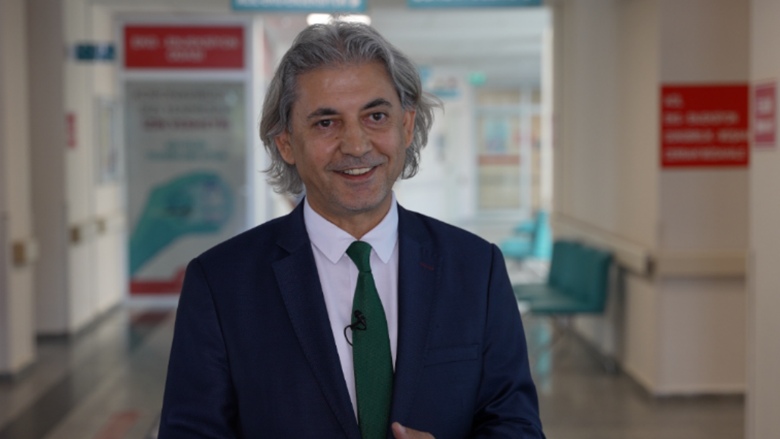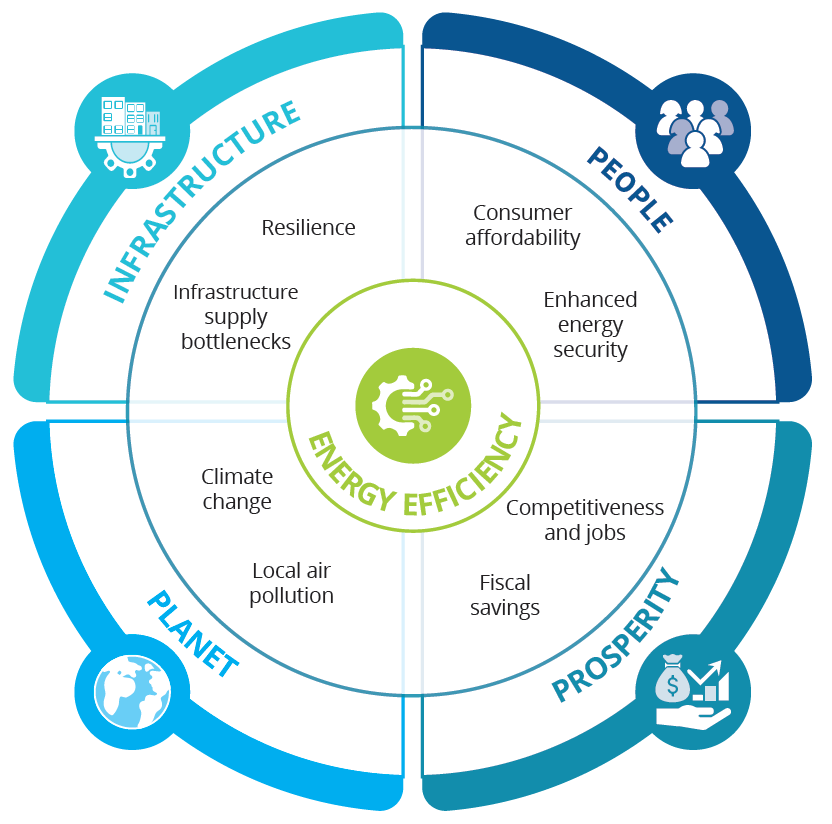Energy efficiency is a transformative, low-cost solution that can fast-track access to affordable and secure energy and boost economic growth. Amid soaring power demand, driven in part by air conditioners, heavy industry, and, increasingly, data centers needed to power artificial intelligence, energy efficiency can help countries avoid overspending on new energy infrastructure, importing fuels, and taking on more debt for their energy sectors.
Scaling energy efficiency can yield a strong return on investment—3 to 5 dollars for every dollar invested—while driving economic growth and jobs, among many other socio-economic benefits. It can improve the living standards and work conditions for more than a billion people around the world who live without accessible, reliable, and affordable energy for lighting, cooking, heating, and cooling, which are increasingly essential to daily activities.
Powering more with less
When Türkiye embedded energy efficiency into its first National Energy Efficiency Action Plan in 2017, it was widely anticipated that the investment would yield good returns. The country mobilized $8.5 billion in investments and has achieved 14% (24 million tonnes of oil equivalent) in primary energy savings. Now, under its 2nd NEEAP, Türkiye is scaling up plans to invest over $20.2 billion in energy efficiency across the residential, commercial, industrial, and public sectors through 2030 to save over 37 million tonnes of oil equivalent.

A World Bank-supported Energy Efficiency in Public Buildings Project helped lay the groundwork for broader market development that can eventually serve the private sector in Türkiye. The project, which was awarded first place in a national productivity competition, was implemented by the Ministry of Environment, Urbanization and Climate Change, together with the Ministry of Energy and Natural Resources. These agencies have developed significant capacity to support energy efficiency renovations in buildings. Now, the government is developing a national program to refurbish about 500,000 public buildings, incentivizing donors, and the private sector to mobilize $8.8 billion in investments.
Since the start of the project, about 372 buildings have been renovated, saving almost 200 GWh per year (equivalent to powering approximately up to 300,000 homes) and cutting $11.5 million in energy bills annually. Nearly 80,000 people now enjoy better working conditions in schools, hospitals, and offices.
“Improving energy efficiency in buildings is a smart business investment,” said Charles Cormier, Regional Director for Infrastructure for Europe and Central Asia. “Türkiye has emerged as a regional leader through its national program and early participation in the World Bank’s new $1.5 billion Scaling Up Energy Efficiency program in Europe and Central Asia. Its experience is helping shape a regional model for large-scale renovations that boost energy security, attract private financing, curb demand, and improve people’s lives,” he added.
The project supported the reform of the Kandıra State Hospital in Kocaeli, which serves 800 patients daily, doubling that number during Summer. As part of its energy efficiency measures, the hospital installed an upgraded automation system to manage heating and cooling, making it easier to detect losses or malfunctions and resolve them quickly.

“We are incredibly proud of the energy efficiency project implemented in our hospital,” said Gürol Aydemir, Financial Affairs Director at the Hospital. “For us, it also means we now generate energy savings even as the hospital’s capacity continues to grow. Between January and April 2025, our electricity bill saw a reduction of nearly 20%. We expect to achieve the project’s goal of 35% energy savings,” Gürol Aydemir said. The hospital will redirect substantial savings toward other essential operating costs.
Powering new opportunities and jobs
In 2022, energy efficiency was the biggest source of jobs across the energy sector, employing nearly 11 million people worldwide. Türkiye’s project provided technical training to more than 3,500 people, upskilling the workforce for jobs in energy services and construction. IFC’s innovative EDGE, a green building certification program, has trained over 10,000 experts globally. In India, Energy Efficiency Services Ltd created almost 700 direct jobs and thousands of indirect jobs in efficient bulbs, electric vehicles, air conditioners, and other appliance production. In the Latin America and Caribbean region, the new Caribbean Efficient and Green-Energy Buildings Project, will upgrade over 500 buildings in Grenada, Guyana and St. Lucia, supporting specific skills training and employment for women.
“Increasing energy efficiency investments in operations can help meet growing energy demand and support energy security while fostering economic growth,” said Maria Marcela Silva, Regional Director for Infrastructure, Latin America and the Caribbean Region. “In Latin America and the Caribbean, energy efficiency investment is still low, but we see an abundance of opportunities across the region and look forward to scaling up our engagements in several countries,” she added.

Upscaling requires urgent collective action
Unlocking the full potential of energy efficiency will require a concerted effort, or a “LEAP” approach featured in a new World Bank Group report. It aims to help clients, donor partners, and the private sector put energy efficiency at the heart of energy policy and planning. Multilateral development banks and donor partners must work together to ensure energy efficiency is prioritized by government policies and strengthened institutions. Technical assistance and financing can support countries to transition smaller-scale projects to national programs over time. Altogether, these efforts will send a powerful signal to the market, which can, in turn, bring in new suppliers and competition, driving down prices for all consumers and mobilizing commercial financing.

Over the past decade, our energy efficiency lending portfolio has supported investments in public and residential buildings, industry, public lighting, and water pumping. Now, the Bank is scaling up impacts through more programmatic approaches, such as the global challenge program on energy, innovative financing, and leveraging the private sector.
“Energy efficiency is a key element of our approach to strengthening the energy sector,” said Demetrios Papathanasiou, Energy and Extractives Global Director. “We are leveraging our Scaling Up Energy Efficiency Academy to foster global knowledge-sharing and help spur policy and institutional reforms. These efforts will help accelerate the transition from pilot projects to scaled-up national energy efficiency programs.”

